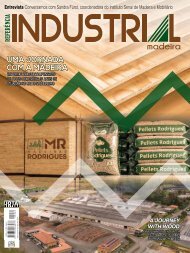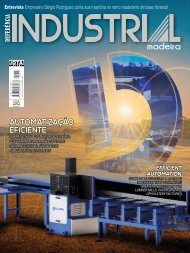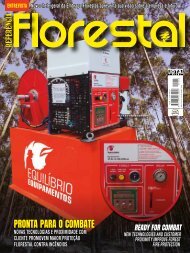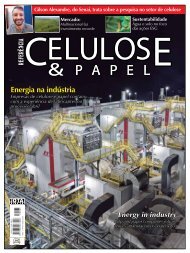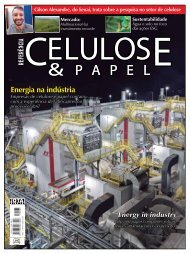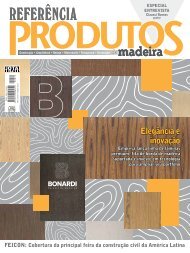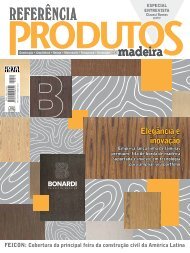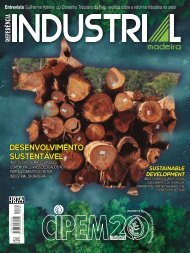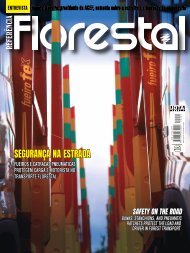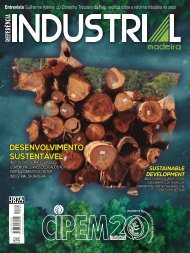You also want an ePaper? Increase the reach of your titles
YUMPU automatically turns print PDFs into web optimized ePapers that Google loves.
A R T I G O<br />
Produção de papel kraft<br />
com fibra reciclada e<br />
celulose microcristalina<br />
PRODUCTION OF KRAFT PAPER<br />
WITH RECYCLED FIBERS AND<br />
MICROCRYSTALLINE CELLULOSE<br />
Fotos: divulgação<br />
RESUMO<br />
As embalagens são largamente produzidas<br />
por celulose de origem vegetal, sendo<br />
caracterizada como FC (fibra curta),<br />
quando a celulose é proveniente de Eucalyptus<br />
spp., e FL (fibra longa), quando<br />
proveniente de Pinus spp. O desenvolvimento<br />
do e-commerce tem aumentado o consumo<br />
de embalagens. Em 2021, houve crescimento econômico<br />
na indústria brasileira de embalagem de 31,1 %<br />
em relação a 2020. Em contrapartida, as áreas plantadas<br />
de Pinus spp. apresentam tendência de desiquilíbrio<br />
entre oferta e demanda no Brasil. Para atender a<br />
demanda do mercado, suprir a falta de matéria-prima<br />
vegetal e produzir papel kraft, de forma menos impactante<br />
ao meio ambiente, muitas empresas estão<br />
aumentando a utilização de fibra reciclada. Contudo,<br />
a sua inclusão na receita pode influenciar diretamente<br />
na qualidade do produto, especialmente a resistência.<br />
Uma alternativa promissora para formação<br />
do papel com uma rede fibrosa forte e resistente é<br />
utilizar a celulose em microescala. Para avaliar a influência<br />
da utilização de fibras recicladas na qualidade<br />
SUMMARY<br />
P<br />
ackaging is largely produced of plant-origin<br />
cellulose and is characterized as short fiber<br />
(SF) when the cellulose comes from Eucalyptus<br />
spp., and long fiber (LF) when it comes<br />
from Pinus spp. The development of e-commerce has<br />
increased the consumption of packaging. In 2021, the<br />
Brazilian packaging industry grew by 31.1% compared<br />
to 2020. Nevertheless, the planted areas of Pinus<br />
spp. show a trend of imbalance between supply and<br />
demand in Brazil. In order to meet market demand,<br />
make up for the lack of vegetable raw materials, and<br />
produce Kraft paper in a way that has less impact<br />
on the environment, many companies are increasing<br />
their use of recycled fiber. However, its inclusion in<br />
the recipe can directly influence the quality of the<br />
product, especially its strength. A promising alternative<br />
for forming paper with a stronger and more resistant<br />
fibrous network is to use cellulose on a micro-scale. In<br />
order to assess the influence of using recycled fibers on<br />
the quality of Kraft paper, the first stage of this study<br />
consisted of producing bench-scale samples of Kraft<br />
paper with different percentages of virgin fiber (SF<br />
52





